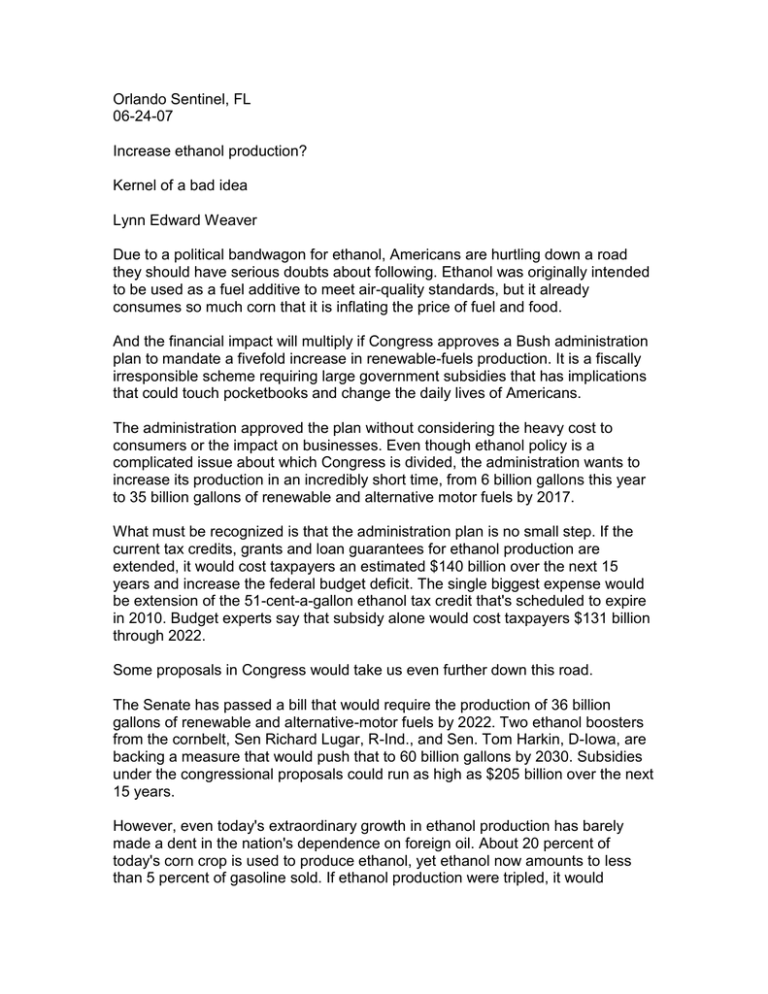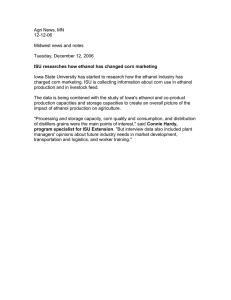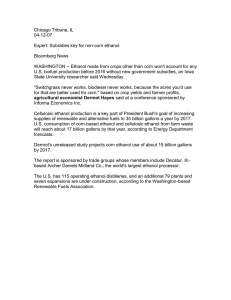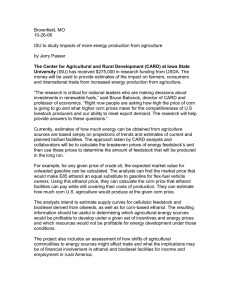Orlando Sentinel, FL 06-24-07 Increase ethanol production?
advertisement

Orlando Sentinel, FL 06-24-07 Increase ethanol production? Kernel of a bad idea Lynn Edward Weaver Due to a political bandwagon for ethanol, Americans are hurtling down a road they should have serious doubts about following. Ethanol was originally intended to be used as a fuel additive to meet air-quality standards, but it already consumes so much corn that it is inflating the price of fuel and food. And the financial impact will multiply if Congress approves a Bush administration plan to mandate a fivefold increase in renewable-fuels production. It is a fiscally irresponsible scheme requiring large government subsidies that has implications that could touch pocketbooks and change the daily lives of Americans. The administration approved the plan without considering the heavy cost to consumers or the impact on businesses. Even though ethanol policy is a complicated issue about which Congress is divided, the administration wants to increase its production in an incredibly short time, from 6 billion gallons this year to 35 billion gallons of renewable and alternative motor fuels by 2017. What must be recognized is that the administration plan is no small step. If the current tax credits, grants and loan guarantees for ethanol production are extended, it would cost taxpayers an estimated $140 billion over the next 15 years and increase the federal budget deficit. The single biggest expense would be extension of the 51-cent-a-gallon ethanol tax credit that's scheduled to expire in 2010. Budget experts say that subsidy alone would cost taxpayers $131 billion through 2022. Some proposals in Congress would take us even further down this road. The Senate has passed a bill that would require the production of 36 billion gallons of renewable and alternative-motor fuels by 2022. Two ethanol boosters from the cornbelt, Sen Richard Lugar, R-Ind., and Sen. Tom Harkin, D-Iowa, are backing a measure that would push that to 60 billion gallons by 2030. Subsidies under the congressional proposals could run as high as $205 billion over the next 15 years. However, even today's extraordinary growth in ethanol production has barely made a dent in the nation's dependence on foreign oil. About 20 percent of today's corn crop is used to produce ethanol, yet ethanol now amounts to less than 5 percent of gasoline sold. If ethanol production were tripled, it would replace about 10 percent of the gasoline. And because ethanol contains onethird less energy than gasoline, it would replace only 7.2 percent by energy content. There's a limit to how much corn can be used for ethanol, since it is used as feed for cattle and in a wide variety of food products ranging from corn meal to soda pop. In fact, researchers at Iowa State University recently predicted that profits could disappear from corn ethanol by the end of this year, in large part due to rising prices of corn feedstock and increased production of the fuel. Those who support the administration plan for a fivefold increase in the use of alternative fuels say that the balance of the supply would come from a mix of cellulosic sources and other fuels. As yet there is no cost-effective technology for producing ethanol from prairie grasses, straw and wood chips; further research and development is needed and should be supported. And a high tariff on sugarbased ethanol from Brazil severely limits its availability. In addition to further raising the price of food, the frenzy for ethanol has its environmental consequences, too. Increased corn production will drain scarce groundwater supplies, require more fertilizer and pesticide use, exacerbate problems from soil erosion, and result in increased emission of global warming gases. The Congressional Research Service has warned of the economic consequences we face due to price volatility if a prolonged drought should occur. Americans should not be fooled into thinking that increasing the government mandate for ethanol will have much effect on foreign-oil dependence. First, we should recognize that the best way to achieve energy security is through a combination of moderate use of ethanol, increased conservation and fuel efficiency, increased funding for energy research and a more reliable mix of oil imports from different regions of the world. Spending huge sums on government subsidies for greater ethanol production would detract from these legitimate efforts. The administration and Congress should focus on ensuring that policy actions meet the needs of the American people. Instead of hobbling the economy with costly new mandates and subsidies for ethanol, we should pursue a balanced strategy that makes far more sense for our economy and consumers alike.



